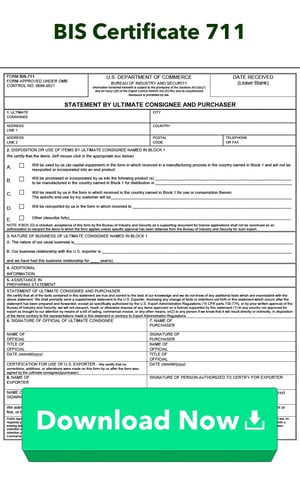 When an export falls into the wrong hands, the potential repercussions extend from financial penalties for the unwary exporter to significant national security concerns for the United States. Beyond adhering to standard best practices like restricted party screening, companies can take an additional measure to thwart unauthorized individuals or entities from acquiring controlled items: requiring an End-Use or End-User Certificate (EUC).
When an export falls into the wrong hands, the potential repercussions extend from financial penalties for the unwary exporter to significant national security concerns for the United States. Beyond adhering to standard best practices like restricted party screening, companies can take an additional measure to thwart unauthorized individuals or entities from acquiring controlled items: requiring an End-Use or End-User Certificate (EUC).
What is an End-Use or End-User Certificate?
Companies use End-Use or End-User Certificates, also called End-Use or End-User Statements or Declarations, to conduct additional diligence to determine whether to proceed in transactions that present concerning characteristics based on geography, counterparty name or address, or other factors.
EUCs are documents issued by the seller in which the buyer affirms the intended end use and end user of specific items. Often, the seller also conveys related legal requirements that apply to the goods (i.e., that they are subject to the Export Administration Regulations (EAR) and may not be diverted onward to a prohibited end user, end use or destination), and the buyer certifies that it understands those requirements and will comply with them.
Depending on the terms of your contract an EUC may also be legally binding on your counterparty. However, you should be aware that from the U.S. government’s perspective, a vetted EUC may show your company’s efforts to be compliant, but it will never be sufficient to mitigate a transaction that is clearly prohibited.
 When is an End-User Certificate required?
When is an End-User Certificate required?
Sometimes, EUCs are not just a good due diligence tool, they are also legally required. Items subject to the EAR may require a BIS-711 or equivalent (meeting the criteria of Supplement No. 3 to 15 C.F.R. 748), while those under the jurisdiction of the Directorate of Defense Trade Controls (DDTC) call for a DSP-83.
A non-exhaustive list of circumstances requiring an EUC includes:
- Export of significant military equipment and classified articles (DSP-83)
- Export of “600 series Major Defense Equipment” (BIS-711)
- Export of certain high-performance computers destined for the PRC (BIS-711)
Export, re-export or transfer of any item subject to the EAR but not subject to a license requirement when the shipment involves a party listed on the Unverified List (requirements outlined in 15 C.F.R. 744.15(b)).
When else might I need an EUC?
Are there situations when an EUC is recommended, even if it is not explicitly required under the ITAR or EAR?
It depends. Companies should exercise good judgment and discretion. This decision requires understanding each organization’s unique risk profile, including the geographies and parties the company sells to and the nature of their exports.
Though a corporate policy requiring EUCs for all shipments might seem prudent, it is not always the most appropriate course of action. For example, a shipment of gummy bears to a destination in the EAR’s Country Group A is low risk both on the basis of the items being exported and on the basis of the intended destination. It would not benefit from an EUC. In this circumstance, requiring this extra document could unnecessarily burden the customer and even result in feelings of ill will.
In other cases, while an End-User Certificate may not be explicitly mandated, it still serves as a valuable due diligence tool. A few examples of this include:
- To ensure extra scrutiny before sales of items with a high potential for use in a military or weapons proliferation application or to parties who may be connected with either use.
- Similarly, to ensure extra scrutiny before sales of items that could be used to support advanced computing in China.
- To certify that an item will not be exported to or transferred to a sanctioned government, party, or activity in cases where the destination country is significantly sanctioned but not comprehensively sanctioned (e.g., Venezuela).
- To curb the diversion of items to comprehensively sanctioned (embargoed) nations like Cuba or North Korea, as well as to countries where the items can only be exported with a license.
- In cases where there are “red flags” (like a buyer alleging to be from a sophisticated company requesting a highly technical product using a personal email account) that would justify a more cautious strategy.
Employing an EUC in these instances helps mitigate risk, verify intended end use/end user, and increase transaction transparency.
Conclusion
In conclusion, EUCs can play a critical role in safeguarding national security, ensuring your organization’s regulatory compliance, and promoting responsible international trade practices.
Using EUCs can proactively mitigate risks and enhance transparency. However, it is essential to recognize that a one-size-fits-all approach to due diligence does not always align with the nuances of complex international transactions. The implementation of End-User Certificates should be a thoughtful and strategic decision tailored to the specific circumstances and risks associated with each export transaction.
By using EUCs, companies can strike a balance between regulatory compliance and the facilitation of legitimate trade, contributing to a safer and more secure global marketplace.
Like what you read? Join thousands of exporters and importers who subscribe to Passages: The International Trade Blog. You’ll get the latest news and tips for exporters and importers delivered right to your inbox.

